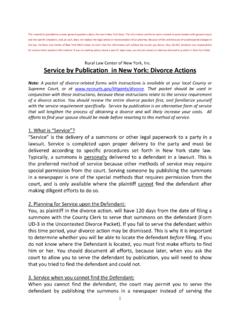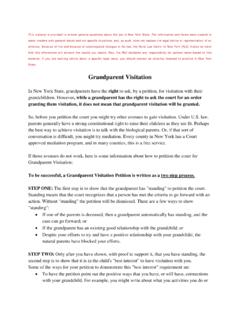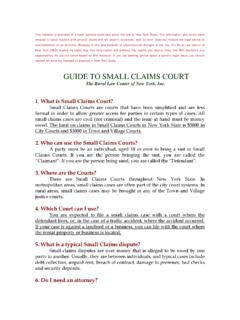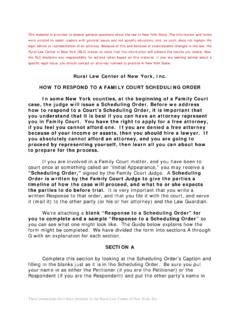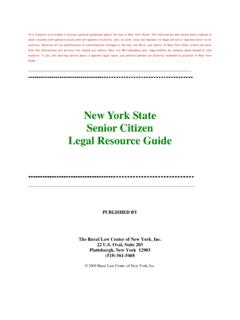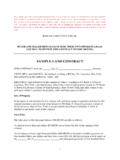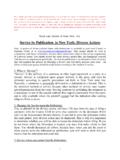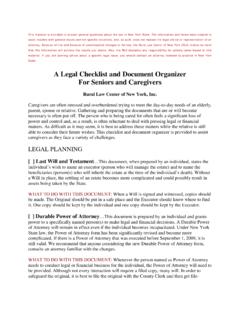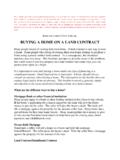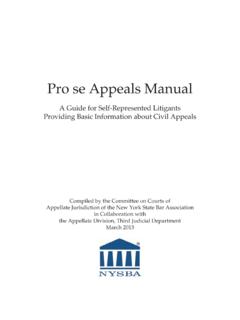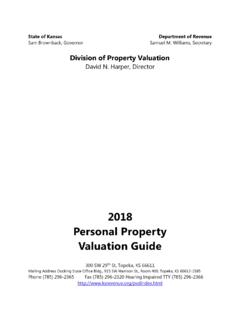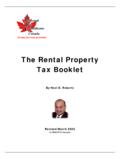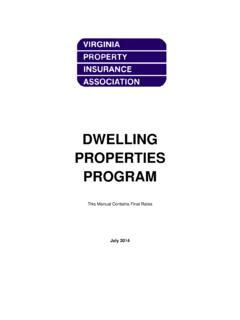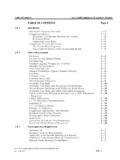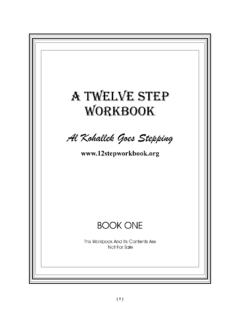Transcription of Writing Your Will - Rural Law Center of New York
1 This material is provided to answer general questions about the law in New York State. The information and forms were created to assist readers with general issues and not specific situations, and, as such, does not replace the legal advice or representation of an attorney. Because of this and because of unanticipated changes in the law, the Rural Law Center of New York (RLC) makes no claim that this information will achieve the results you desire. Also, the RLC disclaims any responsibility for actions taken based on this material. If you are seeking advice about a specific legal issue, you should contact an attorney licensed to practice in New York State.
2 Writing your will An Informational and Educational Guide For Residents of New York State Designed and Provided by the Rural Law Center of New York, Inc. VISIT OUR WEB SITE: Rural Law Center of New York, Inc. your LAST will AND TESTAMENT A GUIDE DESIGNED AND PREPARED BY THE Rural LAW Center OF NEW YORK, INC. SIXTEEN IMPORTANT QUESTIONS 1. What is a LAST will AND TESTAMENT? A LAST will AND TESTAMENT (more commonly known as a will ) is a legal document that specifies how you wish to pass on your property at the time of your death. 2. Who should write a will ? Anyone who is legally an adult and "of sound mind" can make a will .
3 Since no one can guarantee long life, there is no benefit to postponing the Writing of your will . Anyone who wants his or her wishes considered at the time of his or her death should write a will . 3. Why should I write a will ? A legally binding, written will is the only way you can be confident that your property will be distributed according to your wishes. 4. Can't I just tell my family my wishes? If you choose to, you should tell your family how you want your property distributed. However, without a written will backing it up, you have no assurance that your family will be able to carry out your wishes.
4 5. What happens if I don't have a will ? If you die without leaving a will , the State of New York determines how your property will be distributed. If your property is distributed in this manner, it will be dispersed in specific proportions among your surviving relatives. If you have no surviving relatives, your property will revert to the State. 6. How do I begin? The best way to start is to make a list of all of your property and then begin to decide how you would like it dispersed. To help you, we have prepared a worksheet you may find useful. 7. What does a will look like?
5 We have also included here, a sample of a simple will for use in New York State. You will notice that it follows a certain format that formally lists all of your bequests (gifts). Then it is signed by you and also signed by two witnesses. 8. What are the technical requirements of a will ? In New York State, a will must be signed and dated by the person Writing it. It must also be signed and dated by two witnesses. In addition, to avoid possible complications, you will should be typed, not handwritten, and have no additions or corrections to the pages. 9. What is a BENEFICIARY? A BENEFICIARY is the person that you leave some, or all, or your property to.
6 10. What is an EXECUTOR? An EXECUTOR is the person that you name in your will who will be responsible for making sure that your property is distributed according to your wishes. 11. Who should be my EXECUTOR? You are free to choose anyone you want. your EXECUTOR should be someone that you feel is trustworthy and will take the responsibility to ensure that your wishes are carried out. It is a good idea to ask the person if he or she is willing to serve as your EXECUTOR before you name him or her in your will . In the event the person you have chosen cannot serve at the time of your death, you should name a back-up person as well.
7 12. What about my FUNERAL PLANS? It is not a good idea to include your FUNERAL PLANS in your will . A will is not usually read until some time after the funeral. It makes more sense to write out FUNERAL PLANS in a separate document and give that document to the person who would be making the funeral arrangements. 13. Do I need a LAWYER to write my will ? You may decide that you feel more confident if a lawyer prepares your will , especially if your estate is complicated. However, an attorney is not absolutely necessary. If you choose to do your own will , though, you must be sure to follow New York State required procedures for signatures and witnesses.
8 14. Who should be my WITNESSES? your WITNESSES can be any adults that you choose. For convenience, it is good to have witnesses that know you and live nearby. Also, very importantly, your WITNESSES can not be anyone that you have named as BENEFICIARIES in your will . 15. How do I sign my will ? When you have your will written to your satisfaction, arrange for a time to meet with your WITNESSES. Before you sign, say out loud, "This is my Last will and Testament that I am signing and it represents my wishes for the distribution of my property at the time of my death". Ask them to watch you sign, and then have each of them sign as WITNESSES.
9 your WITNESSES do not read the contents of your will , they simply acknowledge that they have watched you sign it. 16. Once it is signed, what do I do with my will ? Make one or more copies of your completed will and keep the original in a safe, fireproof location. Do not keep your will in a bank safe deposit box. Opening a safe deposit box after a death can require a special court order and delay the carrying out of your wishes. Wherever you choose to keep the original of your will , make sure your EXECUTOR knows the exact location. WORKSHEET FOR Writing A will DESIGNED AND PREPARED BY THE Rural LAW Center OF NEW YORK, INC.
10 your NAME _____ FULL ADDRESS _____ _____ EXECUTOR'S NAME _____ EXECUTOR'S ADDRESS _____ _____ ALTERNATE EXECUTOR'S NAME _____ ALTERNATE EXECUTOR'S ADDRESS _____ _____ LIST OF your property 1. Do you own REAL ESTATE? _____ Describe and give address: _____ _____ _____ Who do you want to leave this to? NAME _____ ADDRESS _____ _____ If that person dies before you, whom do you want to leave this to? NAME _____ ADDRESS _____ _____ If you have additional REAL ESTATE, repeat these questions for each separate property on an additional sheet. 2. Do you have BANK ACCOUNTS?
